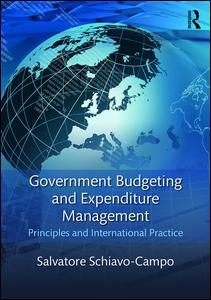Government Budgeting and Expenditure Management Principles and International Practice
Auteur : Schiavo-Campo Salvatore

The government budget should be the financial mirror of society's choices. Yet most people view budgeting as the epitome of eye-glazing subjects, rarely explained in a way that is understandable to the non-specialist and too often presented without adequate consideration of a country?s governance and institutional capacity. Government Budgeting and Expenditure Management fills a gap in the literature to redress these failings and does so in comparative international perspective.
This book provides a comprehensive but pithy and easy-to-understand treatment of public financial management, taking into account a variety of special issues including budgeting in post-conflict situations, at subnational government levels, for military/security expenditures, and in countries with large extractive revenues. Distilling the lessons of budgeting reform in countries at different levels of income and administrative capacity, each chapter gradually progresses from the basic principles to the more technical aspects and then on to implementation issues, using concrete examples and illustrations from around the globe.
Government Budgeting and Expenditure Management is ideally suited as the primary text for advanced undergraduate or graduate courses in government budgeting or public financial management, or as a supplementary text for courses in public finance, public economics, economic development, public administration or comparative politics. With its attention to practical implementation aspects, the book will also be of direct interest to practitioners, policy-makers, and government employee training organizations.
Chapter One: The Government Budget: Mirror of Society’s Choices
Part 1: The Budget Infrastructure
Chapter Two: Budgeting Objectives, Systems, Budget Classification and the Legal Framework
Chapter Three: Budget coverage, Extra-Budgetary Operations and Tax Expenditures
Chapter Four: Fiscal Risk, Fiscal Responsibility and Fiscal Rules
Part 2: The Upstream Stages: Budget Preparation and Approval
Chapter Five: Budgeting in Macroeconomic and Fiscal Perspective
Chapter Six: Preparation and Approval of the Budget
Chapter Seven: Budgeting and Managing Public Investment
Part 3: The Downstream Stages: Budget Execution and Control
Chapter Eight: Budget Execution: Compliance, Adaptability, Efficiency
Chapter Nine: Public Procurement
Chapter Ten: Financing the Budget: Debt and Aid Management
Part 4: Fostering Accountability: For Money and for Results
Chapter Eleven: Accountability for the Money: Accounting, Reporting and Audit
Chapter Twelve: Accountability for the Results: Performance, Monitoring and Evaluation
Chapter Thirteen: Reforming and Strengthening Public Financial Mangement
Part 5: Selected Special Topics in Public Financial Management
Chapter Fourteen: Fiscal Decentralization and Budgeting at Subnational Government Level
Chapter Fifteen: Reconstructing Public Financial Institutions in Fragile and Conflict-Affected States
Chapter Sixteen: Corruption and Public Sector Management
Chapter Seventeen: "Black Boxes": Extractive Revenue and Military Expenditure
Salvatore "Rino" Schiavo-Campo is a former senior official at the World Bank and International Monetary Fund, following a full academic career that concluded as Professor and Chairman of Economics at the University of Massachusetts, Boston. He is the author of numerous scholarly articles and 14 books on topics in public financial management, governance and public administration, economic development and post-conflict reconstruction.
Date de parution : 02-2017
17.8x25.4 cm
Date de parution : 02-2017
17.8x25.4 cm
Thème de Government Budgeting and Expenditure Management :
Mots-clés :
Supreme Audit Institution; Public Financial Management; institutional capacity; Medium Term Fiscal Framework; upstream; Public Financial Management Reform; downstream; Budget Execution; post-conflict; Treasury Single Account; subnational; Budget Preparation Process; security expenditures; Line Ministries; extractive revenues; Fiscal Transparency; Central Government; public economics; Public Financial Management Systems; economic development; Subnational Government; public administration; Subnational Government Level; comparative politics; extrabudgetary expenditure; Budget Preparation; fiscal responsibility; Subnational Government Entities; capital budgeting; Spending Agencies; public investment program; Annual Budget Process; procurement; Financial Management Information Systems; accountability; Fiscal Risk; African Development Bank; Extrabudgetary Fund; Sole Source Procurement; COFOG; Medium Term Expenditure Framework



